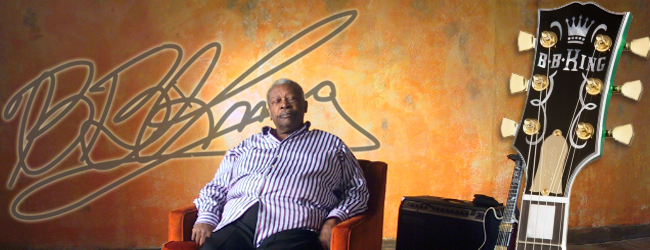
[pullquote]“Lucille don’t want to play anything but the blues”
– B.B. King[/pullquote]Perhaps no guitar in the world is more famous than “Lucille”, the name B.B. King has bestowed upon each of his guitars since the late 1940s. In nearly every picture of B.B. King that exists, his beloved instrument is either in his hands or close by his side. The iconic images, paintings, and sketches of B.B. all have Lucille close to his heart, and the two have been together for so long that one is nearly synonymous with the other.
Perhaps the most interesting way that B.B. has ever told the story about how Lucille got her famous name was, fittingly, in song, with Lucille dutifully playing accompaniment. In the track “Lucille”, off of B.B. King’s 1968 album of the same name, King plays nearly ten minutes worth of soul-stirring guitar licks while talking, just as a loving grandfather tells a story to wide eyed children at his feet, about the instrument that took him from the plantation and brought him fame.
“I was over in Twist, Arkansas”, says King, “And one night, the guys started a ball over there, started brawling… and the guy that was mad with his old lady, when she fell over this gas tank that was burning for heat, the gas ran all over the floor. The building caught on fire and almost burned me up trying to save Lucille.” He catches himself drifting into a story and snaps back to the topic while a saxaphone plays a Jazzy lick. “Oh! I imagine you’re still wondering why I call it ‘Lucille’. The lady that started that brawl that night was named Lucille… And that’s been Lucille ever since to me. ” Indeed, B.B.’s iconic Lucille has been named such since 1949.
Lucille is almost always a Gibson ES-355, almost always manufactured by the Gibson Guitar plant in Memphis, Tennessee. The plant is just a short block off of Beale Street, where as a young man, B.B. King began his iconic career. In 1980, Gibson embraced B.B.’s legacy and created a B.B. King signature “Lucille” guitar, a modified ES-355 with a maple neck, a beautifully inlayed “Lucille” or “B.B. King” on the headstock, and several other technical modifications such as a varitone switch and a lack of F-holes (the holes on either side of the strings that open to the hollow body) to reduce feedback, as per B.B.’s request. The guitar remains a popular signature model to this day. When walking into the Gibson plant, visitors are greeted by a giant, flat three story replica of King’s guitar plastered against the wall, and Gibson has continuously shown B.B. the rich support he deserves, by presenting him with lavish “Lucille”s, possibly the most famous one with B.B.’s own signature inlayed in pearl straight into the fretboard.
On Riding With The King, Eric Clapton’s duet album with B.B., the king of the blues earnestly states on the first track that “I’m gonna play this thing until the day I die,” and he most certainly means it. While it’s been said that B.B. is married to the road, often with an astounding 300-date touring schedule every year, his true marriage is almost certainly to his pride and joy, his world famous Gibson Lucille.
Find Gibson’s Signature B.B. King Lucille on Gibson.com
Visit the American Blues Scene tomorrow to learn about the B.B. King Museum in Indianola, Mississippi in our next installment of B.B. King Week!
B.B. King playing “Lucille” off of his 1968 album of the same name:


